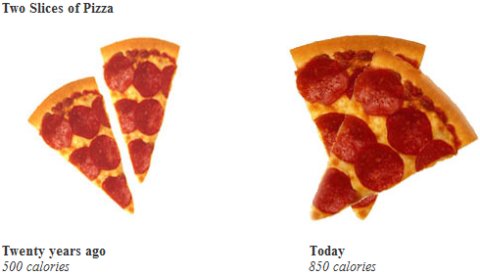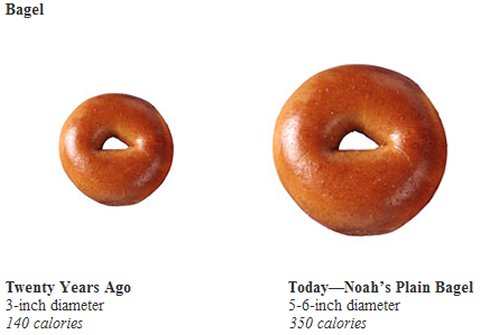Megan McArdle had an interesting-but-lengthy post earlier this week on obesity and both the scientific and political issues surrounding it:
I don’t agree with Paul Campos about everything, but I do agree with some of his core propositions:
- Study after study shows that most people are unable to lose more than a small percentage of their body weight and keep it off without major surgery
- There is evidence to show that this is physiologic rather than pyschological — it is nearly impossible for very heavy people to simply “eat less and exercise more” to a “normal” weight (given that 2/3 of the country is overweight or obese, normal weights, aren’t.)
- The fact that this often operates through the appetite system does not mean it’s “all in their heads” or a lack of willpower. Appetite is a signal as powerful as thirst or pain. Most people can’t ignore it.
- The largest environmental determinant of this trend is probably simply cheaper, tastier calories, which will be very hard to reverse
[. . .]
This really is a pattern that you see over and over again in obesity research. It’s as if researchers are terrified to say anything that might be viewed as giving people license to get fat. The CDC researcher who sharply revised downward the estimates of deaths from obesity, finding that overweight was actually healthier, fell all over herself proclaiming that of course, this didn’t account for quality of life. Because we know that a woman who weighs 160 pounds couldn’t possibly have a decent quality of life . . . ?
[. . .]
I know, I know . . . it’s for the children! I am very fond of children. But I do not actually think that they are some sort of master race in whose name anything at all can be justified. And if I did, I’d be a lot more worried about, oh, abortion, than McDonalds ads.
Two final points. Everyone likes to focus on their favorite boogeymen. To read a left-wing blog, you’d think that about 95% of the leading cause of obesity was agribusiness, chain restaurants, and automobiles. To read a right-wing paper, it’s all the infamous lack of self-control displayed by the poor.
But in fact, most of the things effecting kids are side effects of other efforts a lot of people are rather fond of. Processed foods and chain restaurants have exploded in the last two decades because Mom spends more time outside the home, generating more market income, and less time for home cooked meals. Kids exercise less not because crime is higher, or even because we’ve become more suburban, but because they’re no longer allowed to operate unsupervised until they’re quite old, and Mom and Dad both work. Schools don’t have P/E because they’re using the time to teach kids to read. Maybe those were bad tradeoffs. But they’re not irrational tradeoffs, and switching them back is not costless.
One thing Megan doesn’t touch on in the post (although she had done in earlier posts on this topic) is that metabolic changes over individuals’ lifetimes can actively sabotage good intentions on maintaining a given weight. Up until my late 20s, I could lose weight just by thinking about it, and then suddenly in my early 30s, I discovered that taking weight off was something that now needed a more conscious effort. Now I’m finding it even tougher to manage my weight (and also harder to make and take advantage of opportunities to get some exercise). My innate laziness and enjoyment of good food and good wine can usuallyalways overwhelm any urge to go do something healthy instead.
And no, I didn’t copy the entire post . . . there’s lots more, and it’s all worth reading.





